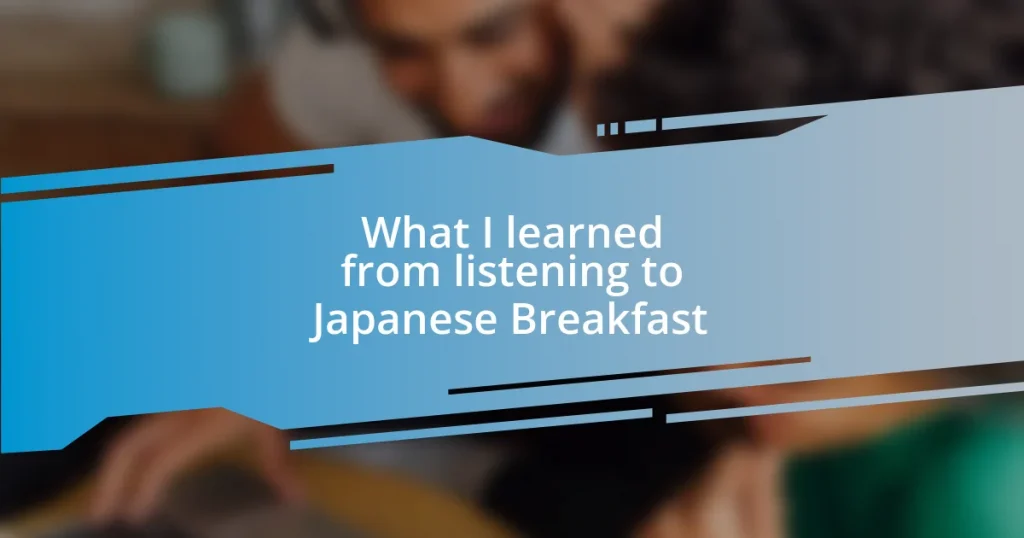Key takeaways:
- Japanese Breakfast, led by Michelle Zauner, blends personal narratives with vibrant melodies, exploring complexity in themes of identity, love, and loss.
- The music features intricate sound layering and contrasts between joy and sorrow, which invite introspection and emotional connection for listeners.
- Engaging with the music encourages reflection on personal experiences and promotes community support, celebrating both vulnerabilities and small daily victories.

Introduction to Japanese Breakfast
Japanese Breakfast is an enchanting indie pop project led by Michelle Zauner, who skillfully weaves personal stories into her music. I remember the first time I stumbled upon her album “Jubilee”; it felt like a beautiful tapestry of emotions, blending tenderness with vibrant energy. Have you ever had that moment when a song resonates so deeply with you that it seems to articulate your own feelings perfectly? That’s exactly what her work does for me.
Her sound is a delightful mix of shimmering melodies and poignant lyrics, often exploring themes of identity, loss, and love. Listening to Japanese Breakfast transports me to a space where I can reflect on my own experiences, often sparking memories of times I’d rather not revisit but ultimately find relatable. Each track feels like a personal letter forged in a moment of intimacy—an invitation to share in her journey.
What stands out to me is how Michelle’s cultural background and personal struggles shape her music. It’s fascinating how moments of grief intertwine with joy, creating a rich emotional landscape that invites listeners to dive deeper into their own narratives. Have you ever been so affected by an artist’s story that it started to change your own perspective? That’s the magic of Japanese Breakfast for me.

Understanding Japanese Breakfast’s Sound
Japanese Breakfast’s sound is a vibrant blend of pop sensibilities and experimental undertones, seamlessly merging the nostalgic with the contemporary. I’ve often found myself lost in the infectious energy of tracks like “Be Sweet,” where the upbeat instrumentals contrast beautifully with introspective lyrics. This juxtaposition strikes a chord with me; it’s like experiencing a moment of clarity amidst the chaos of life. Have you ever felt buoyed by a melody that lifted your spirits while simultaneously reflecting your struggles? That’s the beauty of Zauner’s artistry.
One element that truly captivates me is the layering of sounds in her music. Each listen reveals hidden details I didn’t catch before, like the intricate arrangement in “Road Head” that creates an emotional depth. When I hear that track, I’m reminded of late-night drives with friends—those moments filled with laughter yet tinged with a sense of longing. It’s akin to a warm yet bittersweet memory that lingers, inviting me to delve deeper into my own past. This incredible ability to evoke such strong feelings is something I cherish about Japanese Breakfast.
Listening to her music often feels like a journey through contrasting landscapes, where light and dark coexist harmoniously. The incorporation of varied instruments, which might include everything from lush synthesizers to more traditional sounds, creates a rich auditory experience. I was particularly moved during a live performance, where the energy in the room shifted dramatically between euphoric highs and introspective lows—reminding me of life’s unpredictable nature. This profound musical experience encourages me to reflect on my own highs and lows, making each song a personal exploration.
| Element | Description |
|---|---|
| Melody | Shimmering and vibrant, often uplifting |
| Lyrical Themes | Exploration of identity, love, and loss |
| Instrumentation | A blend of electronic and traditional sounds |
| Emotional Impact | Evokes nostalgia and introspection |

Key Themes in Their Lyrics
Japanese Breakfast’s lyrics often dive deep into themes that resonate on many levels. For me, one of the most striking aspects is how Michelle Zauner articulates feelings of vulnerability and resilience. I vividly remember listening to “Everybody Wants to Love You” and getting lost in the back-and-forth between longing and self-acceptance. It’s a reminder that love can be both uplifting and challenging—a duality we all experience. The way these themes unfold in her music feels like she’s inviting us to share our own stories of vulnerability.
- Identity and Heritage: Exploration of personal roots and cultural experiences.
- Grief and Loss: Honest reflections on coping with the absence of loved ones.
- Resilience and Empowerment: Emphasis on finding strength amidst adversity.
- Yearning and Desire: Capturing the essence of unfulfilled feelings and ambitions.
- Joy and Celebration: Balancing the bittersweet with moments of happiness.
In many tracks, I find myself pondering the delicate balance between joy and sorrow. Listening to songs like “Diving Woman,” I can’t help but feel her struggle and triumph reverberate through the music. It’s as if she’s holding up a mirror, reflecting my own experiences of navigating the complexities of life. I appreciate how her honesty in songwriting creates a profound connection—one that encourages me to embrace both my struggles and my happiness.

Emotional Impact of Their Music
The emotional impact of Japanese Breakfast’s music often strikes me in unexpected ways. For instance, when I listen to “In Hell,” I can’t help but feel a wave of nostalgia wash over me. The haunting melody combined with profound lyrics transports me back to a moment from my past when I was grappling with a sense of loss. Have you ever had a song that just knows how to reach into your heart and pull out those raw emotions? That’s precisely what Zauner’s art does—she offers a space to confront feelings we might be hesitant to face.
Her use of contrasting themes creates an emotional rollercoaster. I remember hearing “Boyish” for the first time and feeling an immediate connection to its themes of yearning and self-discovery. The instrumentation builds a sense of longing that resonates deeply within me. It’s like hearing someone articulate what I couldn’t find the words for myself. This ability to capture that feeling makes me wonder: how can music be such a powerful vessel for emotional expression? It truly shows that art can connect us, illuminating our shared human experiences.
What really moves me is how Japanese Breakfast invites listeners to engage with their own stories through her music. Tracks like “Kokomo, IN” embody this—pulling me into a reflection on my own childhood memories and my journey toward understanding my identity. It’s an invitation that’s both comforting and challenging, as it encourages me to embrace my personal narrative. Why does it feel so liberating to sing along to a song that encapsulates my own struggles and triumphs? I think it’s the sense of validation: the realization that I’m not alone in navigating the complexities of life.

How to Incorporate Their Lessons
To incorporate the lessons from Japanese Breakfast into daily life, I suggest starting with an open heart. When I immerse myself in songs like “Diving Woman,” I often reflect on my own struggles and triumphs. How can we draw strength from our vulnerabilities? For me, it’s about acknowledging those moments of doubt and using them as fuel for growth. By sharing these experiences with others, just as Zauner does, we create a community of resilience and support.
Another practical approach is to embrace the theme of identity and heritage that permeates their music. Listening to “Kokomo, IN,” I am reminded of the importance of celebrating my roots. Have you ever felt a deep connection to your own background while listening to a song? I think it’s essential to explore and reflect on cultural experiences, allowing them to shape who we are. Writing about these reflections in a journal or discussing them with friends can deepen our understanding and appreciation of ourselves.
Finally, I find that finding joy and celebration in everyday moments immensely boosts my spirit. Japanese Breakfast excels at balancing bittersweet emotions with uplifting sounds. When I catch myself humming to “Everybody Wants to Love You,” I’m prompted to celebrate small victories throughout my day. How often do we pause to appreciate life’s little joys? Incorporating gratitude practices, like keeping a gratitude list, allows us to recognize and celebrate even the simplest moments. By engaging with these lessons, I feel more connected to my experiences and, ultimately, to others.

Personal Reflections on My Experience
Listening to Japanese Breakfast has been quite an illuminating journey for me. I recall a long, contemplative walk during which “Road Head” played in my ears. With each note, I found myself reflecting on the struggles of intimacy and connection. It was as if the music unlocked a door to buried thoughts, compelling me to examine my own relationships and fears of vulnerability. Have you ever heard a song that turned your thoughts inward like a gentle nudge? That’s precisely what happened to me.
There was a moment when I was driving home late at night, the moon shining bright, and “Be Sweet” came on. The energetic yet poignant lyrics made me feel alive and invigorated, reminding me of the importance of joy amidst uncertainty. It struck me that music has this incredible power to shift our mindset—almost like a reset button for our emotions. I found myself smiling, not just because of the melody but because I was reminded that it’s perfectly okay to seek happiness even when life gets complicated. Isn’t it interesting how a song can change your mood in an instant?
The habit of revisiting their songs during different phases of my life has turned into a comforting routine. Each time, the lyrics resonate on a different level, almost like they evolve with me. For instance, I discovered a deeper appreciation for “Pasting” after experiencing a significant change in my life. The themes of reinvention and hope spoke directly to my heart. Have you ever felt that connection with a song, where it’s almost as if it’s written for your present self? That experience underlines the beauty of music—its capacity to grow alongside our own personal narratives.
















